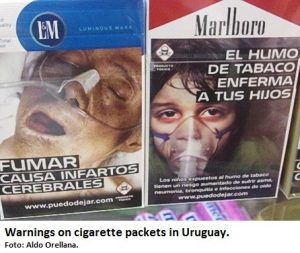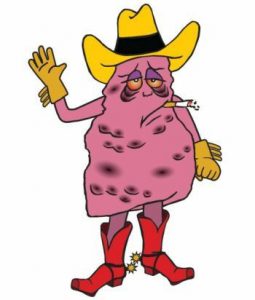Picking up from my previous post, where I had examined Uruguay’s victory over Philip Morris in light of other successful plain packaging regulations; I now delve into the merits of the Philip Morris-Uruguay award, as well as examine the question of expropriation of trademark rights. For background reading on this issue, we have widely covered both International as well as Indian developments in plain packaging laws in the past. More specific to plain packaging in light of Investor State Dispute Settlement (ISDS), there is also Ankita Ritvik’s excellent article in the Harvard International Law Journal.
Image may be NSFW.
Clik here to view. Uruguay’s landmark victory earlier this month was a culmination of a six year long legal tussle. It was in February 2010 that Philip Morris International (PM) filed a request for arbitration to ICSID, going under the Switzerland-Uruguay Bilateral Investment Treaty (BIT), and claiming in essence – that they had been deprived of their intellectual property rights. Soon after, PM’s Asian subsidiary – Philip Morris Asia Limited filed an arbitration claim against the Australian Government in November 2011, this time under the Hong Kong-Australia BIT, making much the same arguments regarding Australia’s legislation that completely prohibited any branding on cigarette covers. While a UNCITRAL tribunal dismissed PM Asia’s claims purely on the fact that they did not have the jurisdiction to hear the case; the ICSID-Uruguay tribunal delved into the merits of the dispute, making it the first international dispute resolution tribunal to have decided on the matter.
Uruguay’s landmark victory earlier this month was a culmination of a six year long legal tussle. It was in February 2010 that Philip Morris International (PM) filed a request for arbitration to ICSID, going under the Switzerland-Uruguay Bilateral Investment Treaty (BIT), and claiming in essence – that they had been deprived of their intellectual property rights. Soon after, PM’s Asian subsidiary – Philip Morris Asia Limited filed an arbitration claim against the Australian Government in November 2011, this time under the Hong Kong-Australia BIT, making much the same arguments regarding Australia’s legislation that completely prohibited any branding on cigarette covers. While a UNCITRAL tribunal dismissed PM Asia’s claims purely on the fact that they did not have the jurisdiction to hear the case; the ICSID-Uruguay tribunal delved into the merits of the dispute, making it the first international dispute resolution tribunal to have decided on the matter.
As I had mentioned in my previous post, the Tribunal upheld the legality of two of Uruguay’s regulations. The first (Single Presentation Requirement, or SPR) prohibits tobacco companies from marketing cigarettes in ways that falsely present them to be less harmful than others, by using words such as “mild” and “light”, and hence resulted in seven out of twelve of PM’s cigarette brands being branded illegal. The second, requires tobacco companies to use 80% of the front and the back of cigarette packs for graphic health warnings (80/80 Regulation).
Expropriation in its most general sense, is the taking of private property by a Government. Article 5 of the BIT prohibits such a measure unless it was taken for public benefit, on a non-discriminatory basis, and under due process of law – provided that provisions were made for adequate compensation. Philip Morris’ central argument was that since their trademarks constituted their private property, the Regulations that denied them the right to use said trademarks were expropriatory in nature. In order to decide whether Uruguay’s legislation amounted to the expropriation of PM’s trademark rights, the considerations were as follows:
Whether their trademarks constituted their assets/property
Both the BIT’s mentioned above provided for the protection of the assets of the Investor (PM, in this case) and the treaties defined assets to include intellectual property rights. Noting that the question of whether PM owned the trademarks had to be proved under Uruguayan law, the Tribunal focused on the Uruguayan provision that only a change in the distinctive character of the trademarks would invalidate them. However, the Tribunal did not find it necessary to reach a definitive conclusion on the question of PM’s ownership of the trademarks, and merely assumed that they continued to enjoy protection under Uruguayan law.
Whether there was substantial deprivation of their property
- Indirect Expropriation
The tribunal noted first, that the legal title to the property of PM was not affected by Uruguay’s legislations as they remain the registered owners or licensees of the relevant trademarks, and hence their claim related to one of indirect expropriation. While parties are at loggerheads in most investor-state disputes as to what exactly constitutes indirect expropriation, it has been held by tribunals in the past that: as opposed to direct expropriation, which involves the taking of property, indirect expropriation may occur when measures short of an actual taking, ‘result in the effective loss of management, use or control, or a significant depreciation of the value, of the assets of a foreign investor’. The tribunal noted that in order for the regulations to constitute indirect expropriation, they must have had a major, adverse impact on PM’s property.
80/80 Regulation: The Regulation that limited PM to using only 20% of the front and back of the packaging to display ‘visual elements’ of their brand was seen to not constitute prima facie indirect expropriation. The Tribunal was of the opinion that a 20% limitation would not have a substantial effect on the Claimants business, as it was a limitation only on the modalities of the use of the trademarks.
SPR: The Tribunal was of the opinion that the all of PM’s brands currently for sale in Uruguay should be seen as one comprehensive investment, and that the partial loss of profits would not classify as indirect expropriation, as long as sufficient value remained, and placed reliance on LG&E v. Argentina.
- Whether trademark law consists of a positive right to use the mark, or simply a negative right to prevent others from using it
Interestingly, Uruguay argued that their trademark law did not provide for a positive right to use a trademark, but only the negative right to prevent others from using it. The Tribunal partly disagreed, and held that the ownership of a trademark does indeed, in certain circumstances grant a right to use, but only exists vis-à-vis other people, and not against the State – making it a relative right, subject to the State’s regulatory power. Such a question would not arise in India, as the Trademarks Act, 1999 makes clear, in Section 2(zb), that the owner of a trademark indeed does have the right to use the mark.
- Bona fide exercise of Uruguay’s police power to protect public health
The Tribunal agreed with Uruguay in stating that their police powers to protect public health would act as an exception to expropriation, and stated that customary international law had long recognized the protection of public health as an essential manifestation of the State’s police powers. In conclusion, the Tribunal determined that both the SPR and the 80/80 Regulation had been adopted in the bona fide fulfillment of Uruguay’s national and international legal obligations for the protection of public health, and hence did not constitute expropriation.
The Tribunal went on to hold that the Regulations were non-discriminatory, reasonable, made in the interest of legitimate policy concerns and with no intention to deprive PM of their investment; as well as dismissed PM’s claims of the deprivation of Fair and Equitable Treatment and the Denial of Justice by the Uruguayan Courts. It is also significant that the World Health Organization and the WHO Framework Convention on Tobacco Control (WHO FCTC) Secretariat submitted an amicus brief during the proceedings, which set out the public heath evidence underlying Uruguay’s plain packaging laws. It was accepted by the Tribunal as an independent perspective of a qualified agency.
This decisioImage may be NSFW.
Clik here to view. n is landmark as it is the first international decision to uphold plain packaging regulations: the Australia UNCITRAL case did not delve into merits, and the WTO Dispute filed by Indonesia against Australia is yet to be concluded. On the 30th of June, 2016 it was announced that the Panel’s final report would only be issued at the end of the year, due to complexities in the legal and factual issues that arise in this matter. There have been reports that this decision will now encourage other Countries to enact plain packaging laws, with Canada and Malaysia now set to go the same way. While ICSID decisions cannot act as binding precedent due to the lack of stare decisis in Investor-State arbitration, it is nevertheless a monumental victory for public health, and as John Oliver is always quick to remind us – #Jeffwecan.
n is landmark as it is the first international decision to uphold plain packaging regulations: the Australia UNCITRAL case did not delve into merits, and the WTO Dispute filed by Indonesia against Australia is yet to be concluded. On the 30th of June, 2016 it was announced that the Panel’s final report would only be issued at the end of the year, due to complexities in the legal and factual issues that arise in this matter. There have been reports that this decision will now encourage other Countries to enact plain packaging laws, with Canada and Malaysia now set to go the same way. While ICSID decisions cannot act as binding precedent due to the lack of stare decisis in Investor-State arbitration, it is nevertheless a monumental victory for public health, and as John Oliver is always quick to remind us – #Jeffwecan.
(Documents relevant to the Award are available here, and images were taken from here and here)